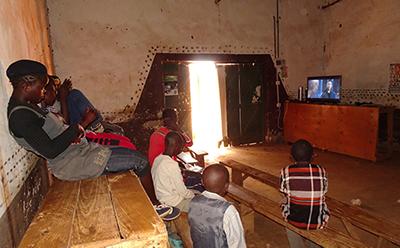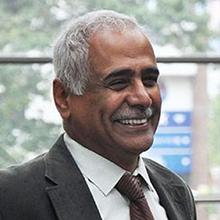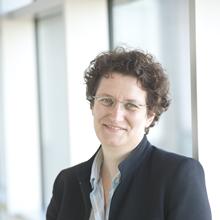Adapting to future energy demands
Delivering energy smarter, locally and globally.
We are consuming energy on an unprecedented scale. Today, it is estimated that we are using the equivalent of 1.6 planet Earths to provide all our resources; in other words, it takes over a year and a half for the Earth to regenerate what we use in a single year. Southampton research teams are developing new ideas and working with communities to deliver energy in a smarter way to help us adapt to our growing energy demands.
During last year’s UN climate change conference in Paris, world leaders agreed that we need to limit global warming to less than two degrees Celsius. “To meet this challenge we need to look at different resources, including renewable energy such as solar and wind, as well as changing our consumption patterns,” says Professor AbuBakr Bahaj, Head of the University’s Energy and Climate Change Division (ECCD).
The world’s growing population makes this challenge even more pressing. “We will reach 10 billion by the end of the century, and today more than half of people live in cities, which is unprecedented in human history,” says Professor Jane Falkingham, Director of the Economic and Social Research Council’s Centre for Population Change. “As developing countries modernise and embrace modern technology, their energy needs and demands will continue to increase.”
As countries without advanced electricity grids start to develop, it’s really important to integrate sustainable energy from the outset so they don’t need to build infrastructure based on consuming fossil fuels.
Delivering sustainable energy to rural areas
A Southampton research team led by AbuBakr and Jane has transformed lives in six African villages by introducing electricity powered by solar energy. As an initial pilot project, they provided power to Kitonyoni village in Kenya through a solar photovoltaic system with battery storage; the electricity was distributed across the village via a mini-grid. The researchers provided support and training on using the new technology to empower the people living in the villages to use and maintain it. This pilot project was so successful that it was rolled out in five other villages across Kenya, Cameroon and Uganda, at the requests of their respective governments.
“As countries without advanced electricity grids start to develop, it’s really important to integrate sustainable energy from the outset so they don’t need to build infrastructure based on consuming fossil fuels,” says Jane.

The terrains and climates of the villages varied considerably, so the team came up with some novel solutions to adapt to these differences. “Two of the villages in Kenya are in very arid areas, so we designed the project so that the solar panels provide shading and capture rainwater as well as delivering energy,” says AbuBakr. The water supply became one of the income sources for the cooperative that manages the project. In addition, the research team helped to set it up the cooperative as a microfinance company that now helps people to buy lanterns and provides loans for business development. “So as well as an energy supply, the community now has a microfinance bank, a water-selling company and a community centre for the villagers to have meetings in a shady area,” says AbuBakr.
There are also wider impacts on health, wellbeing and education. “Health clinics now have electricity to refrigerate medicines and midwives no longer need to use torches when delivering babies at night; the schools can open earlier and close late, and children can do their homework in the evenings,” says Jane.
In collaboration with the governments of Kenya and Uganda, the team is now hoping to deliver these types of benefits to 150 more villages in Uganda and 60 in Kenya.
The impact of this research extends across the world: AbuBakr is also leading a project to introduce solar and wind renewables to rural areas in the Philippines, and is working with King Abdul Aziz University in Jeddah, Saudi Arabia, to deliver solar energy to 100 homes in the city to shave off some of the air-conditioning demands.
Tackling energy consumption in cities
Eighty percent of global emissions come from cities, and Southampton is part of a collaborative £6.2m research programme that aims to address emission reductions in cities. Funded by the Engineering and Physical Sciences Research Council, the Liveable Cities project involves an in-depth assessment of how cities are performing now, what they need to achieve by 2050 to meet carbon reduction targets and how this could affect people’s wellbeing.
Cities, where most of the world’s population resides and the majority of economic activity occurs, will need to be sustainable. Energy access is part of the UN Sustainable Development Goals and is extremely important for the development of over a billion people. Our multidisciplinary research has global impacts and is informing policy
The Southampton research team led by AbuBakr and includes Jane, Professor Patrick James, Dr Luke Blunden and Dr Milena Buchs, is initially surveying 250 households to investigate their energy consumption. The researchers will be collecting data from the households through installed monitors in homes to check temperature, humidity and energy consumption, as well as face-to-face interviews with residents. Understanding behavioural change will be key: by showing people how their energy consumption compares with their neighbours, the team aims to find out if peer pressure causes behavioural changes in energy consumption.
The researchers will also be installing energy meters in social housing in Portsmouth, to investigate where energy efficiency gains can be made. “Many of the tower buildings in Portsmouth are electrically heated and if we can make these buildings more efficient and reduce heating bills, this will have a big impact on fuel poverty,” says AbuBakr.
In collaboration with Xi’an University of Architecture and Technology in China, AbuBakr and his team are also working on a project to explore how to reduce the carbon emissions of cities, using Portsmouth in the UK and Xi’an in China as case studies.
“The crux of this is understanding how we can deliver energy more efficiently to two cities with very different infrastructures and cultures – what we can learn from the challenges faced by each of them,” says AbuBakr. Generating and storing energy locally will be a key feature and the team will be looking at innovative ways to provide heat efficiently during colder months.
“The interaction between the technology and the people using it is the most challenging and exciting aspect of this research and here at Southampton we are excellently placed to address this,” says Jane. “We have leading engineers working in energy technologies and the UK’s leading group of demographers to understand the human behaviour to ensure people can get the most benefit from them. Building on these strengths, our research will continue to deliver life-changing renewable energy to communities worldwide.”
Links to external websites
The University cannot accept responsibility for external websites.
More information about AbuBakr's research
More information about Jane's research
You may also be interested in:

Improving lives worldwide
Supporting the UN Sustainable Development Goals to improve lives around the globe.

Health impact of air pollution
According to a new report involving Southampton researchers, air pollution causes around 40,000 deaths and costs the UK economy £20bn every year.

Volcanoes kick-start life
Volcanoes altered ocean chemistry, stimulating production of multicellular organisms.

